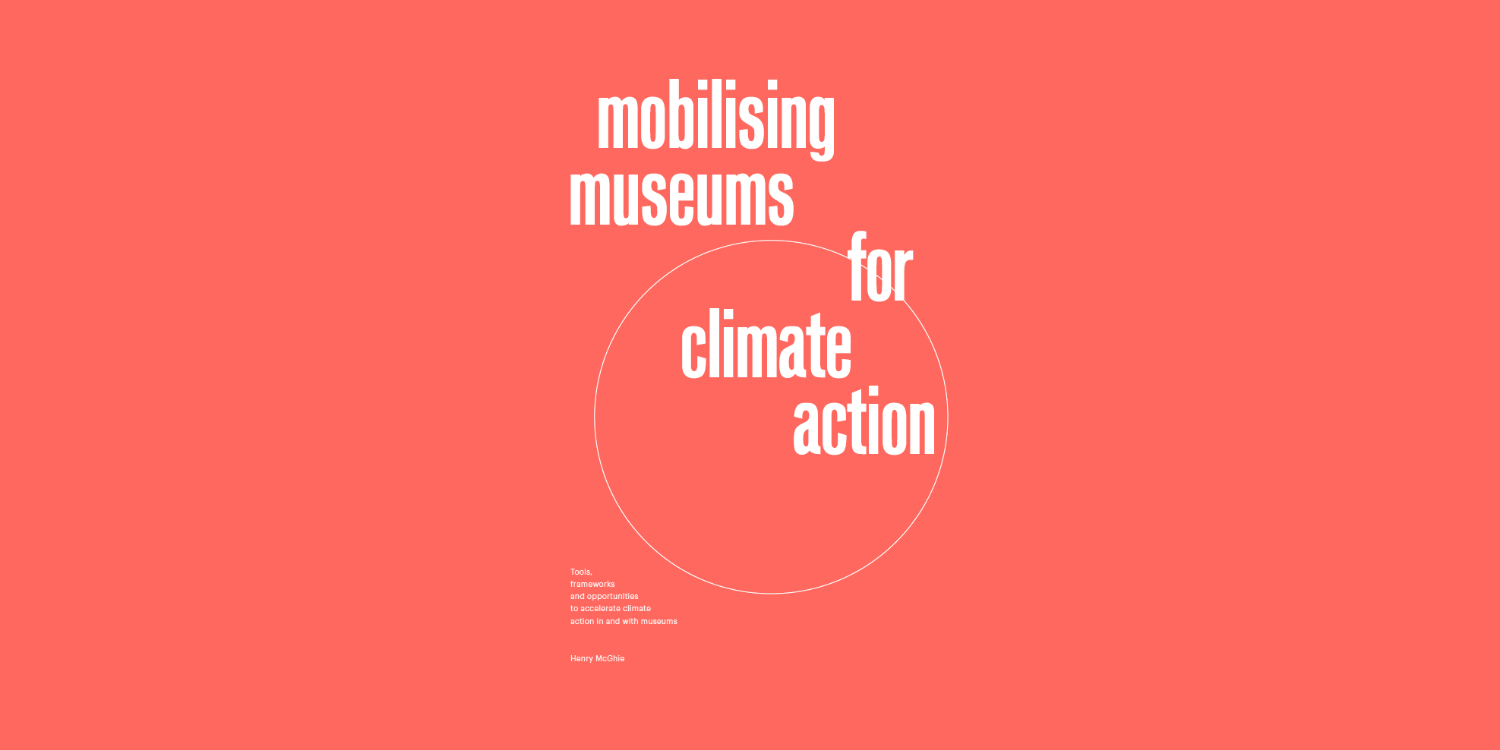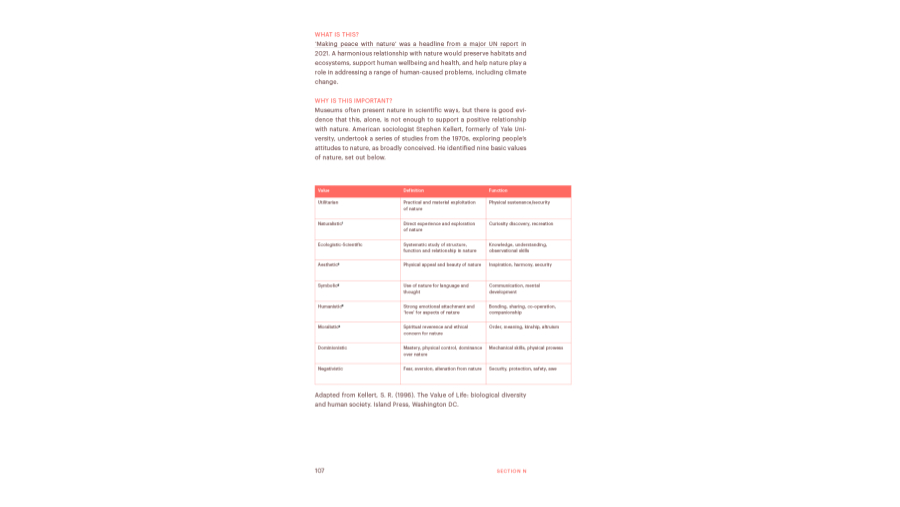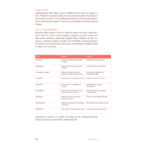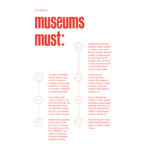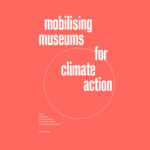Climate change is big news, with more and more stories in mass media of the challenges to come, and the challenges many face now. Museums are increasingly concerned with climate change and climate action, but it can seem complicated or off-putting, and many museums and travelling exhibitions producers and hosts are unsure of what they can do.
‘Mobilising Museums for Climate Action: Tools, frameworks and opportunities to accelerate climate action in and with museums’ is an open-access publication developed by the project Museums for Climate Action. This project is the UK Arts and Humanities Research Council Heritage Priority Area contribution to the UK’s time as host of COP26. Museums for Climate Action is headed up by Rodney Harrison (Professor of Heritage Studies, UCL) and Colin Sterling (Assistant Professor of Museums and Memory at the University of Amsterdam), working with Henry McGhie (Curating Tomorrow) and in partnership with Glasgow Science Centre.
Museums for Climate Action started as an international design and ideas competition in May 2020. The competition received 264 entries from 48 countries. Eight of these were featured in an exhibition at Glasgow Science Centre ahead of and during COP26, the United Nations Climate Change summit. The project also developed a website (www.museumsforclimateaction.org) that features 81 concepts from the competition submissions as well as additional resources. An open-access book, Reimagining Museums for Climate Action, edited by Rodney Harrison and Colin Sterling, includes reflections on museums and climate action from a wide range of perspectives.
The Mobilising Museums for Climate Action ‘toolbox’, by Henry McGhie, aims to help address this need, helping those working in and with museums to understand the elements of climate action, sign-post them towards practical tools and help them connect their work with the bigger picture of climate action and sustainable development. This can be downloaded as a PDF, or viewed online as a web-based version that can be read in other languages to help support climate empowerment everywhere.
An open-access book, Reimagining Museums for Climate Action, [...] includes reflections on museums and climate action from a wide range of perspectives.
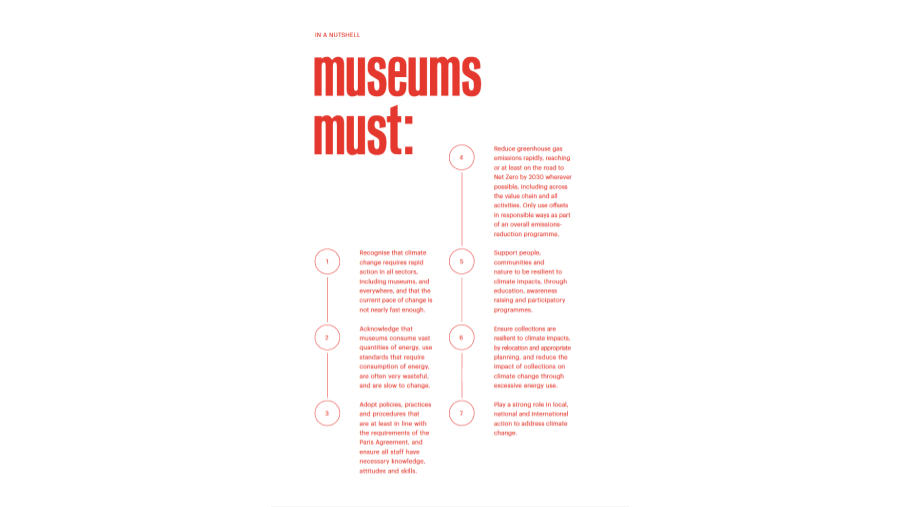
As a summary, ‘Mobilising Museums for Climate Action’ sets out that, in order to address climate change, museums must:
- Recognise that climate change requires rapid action in all sectors, including museums, and everywhere, and that the current pace of change is not nearly fast enough.
- Acknowledge that museums consume vast quantities of energy, use standards that require consumption of energy, are often very wasteful, and are slow to change.
- Adopt policies, practices and procedures that are at least in line with the requirements of the Paris Agreement, and ensure all staff have necessary knowledge, attitudes and skills.
- Reduce greenhouse gas emissions rapidly, reaching or at least on the road to Net Zero by 2030 wherever possible, including across the value chain and all activities. Only use offsets in responsible ways as part of an overall emissions-reduction programme.
- Support people, communities and nature to be resilient to climate impacts, through education, awareness raising and participatory programmes.
- Ensure collections are resilient to climate impacts, by relocation and appropriate planning, and reduce the impact of collections on climate change through excessive energy use.
- Play a strong role in local, national and international action to address climate change.
Climate action comes in two main forms: mitigation action, that reduces greenhouse gas emissions and strengthens nature’s ability to absorb them (so leading to a reduction in greenhouse gas levels in the atmosphere); and adaptation action, that helps people and nature cope with current and future climate impact.
If we accept the seven points listed above as a kind of over-arching framework or set of goals, there are five main ways that museums can take part in climate action, to achieve these goals.
1 – Mitigation through museums
Museums must support all of society to reduce its greenhouse gas emissions, rapidly, in line with Paris Agreement commitments, by encouraging and empowering people to understand the part they have to play in climate action and have the skills to play it, and to use less, waste less, and make sure anything they do use is renewable. They can foster support, and sharing of resources, for nature conservation efforts that strengthen nature’s ability to absorb greenhouse gas emissions.
2 – Mitigation in museums
Museums must aggressively reduce greenhouse gas emissions across all aspects of their activity, in line with Paris Agreement commitments. They can ensure all staff, and all people and organisations in the value chain understand the part they have to play in climate action, and are empowered to act through policies and resourcing so that every action is supporting climate action, in order to use less, waste less, and make sure anything that is used is renewable. They can direct financial and other resources towards nature conservation efforts that strengthen nature’s ability to absorb greenhouse gas emissions, through their everyday decisions and procurement practices.
3 – Adaptation through museums
Museums must support all of society, and nature, to face and cope with current and projected climate change impacts.
4 – Adaptation in museums
Museums must understand how they will be impacted by climate change, and adapt their practices, location, programmes and collections to be fit for the future.
5 – Climate action as part of sustainable development, climate justice and a just transition
Museums must ensure that all climate-change activity is undertaken in ways that do not themselves disenfranchise people or communities, locally or globally; and recognise that, in tackling climate change, other sustainable development challenges have to be addressed at the same time.
Mobilising Museums for Climate Action includes sections on the following topics:
- Sets out the context of the UNFCCC, Paris Agreement and Sustainable Development Goals.
- Sets of questions help readers explore where they are trying to get to in terms of climate action, and where they are now.
- The need for climate action in terms of the impacts of climate change on people and nature.
- Climate mitigation: reducing greenhouse gas emissions explores how emissions are measured in three Scopes, and discusses Net Zero
- Climate adaptation and resilience
- Disaster Risk Reduction approaches and ‘Build Back Better’
- How climate change relates to human rights and climate justice
- Common But Differentiated Responsibilities explores the responsibility of wealthy countries to support less wealthy countries
- Participation and education for climate action
- Nature’s roles in climate action
- Approaches to heritage as sources of problems and responses to climate action
- Exploring the Reimagining Museums for Climate Action project
- Current opportunities that all museums can take part in to support climate action
Every museum, museum worker, organisation and activity – including touring exhibitions – has a part to play in climate action, and this toolbox should help touring exhibitions stakeholders play their part with greater confidence and ability.
About the authors & contributors
Henry McGhie runs the UK-based museum consultancy Curating Tomorrow, focussed on supporting museums and similar institutions to enhance their contributions to sustainable development agendas, including the SDGS, climate action, biodiversity conservation.


